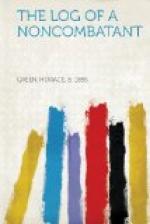After Uhlman, the fat merchant, left, we were alone in the second-class compartment, and the doctor got up and shut the door on the noise of Landwehr soldiers singing in the section of the troop train attached behind the car. Presently he showed me two postals from his boy. They were the stereotyped cards allotted to the men on the field: on one side space for the address, on the other side the printed word “well,” space for the date (but no locality), and the signature. The third card was a casualty report, signed, probably, by the company captain, with the three printed words “slightly wounded,” “wounded,” and “severely wounded.” The first and last were scratched out, but after the word “wounded” was written, “condition low.”
The boy must have held out—because the body was sent to Aix—until well along the homeward Red Cross trip. During the Antwerp bombardment, at Brussels, Liege, and Louvain, I had seen scores of the wounded, and had myself slept on those trains with their households of blood and pain and ether, and their long lines of mail cars, box cars, and converted tram cars fitted with their triple rows of berths, one above another. As the old doctor talked, I could see the wheeled hospitals stealing into the city in the darkness—for the troops go off with bands and holiday accompaniment, but the return is made at dead of night, that the public may not know the human cost.
“We must have peace,” the doctor finished, “and we must have it soon. I do not say this because I have lost a son, and I do not say it alone. There are thousands who feel it just as much, but they are afraid to speak what is in their mind. You are a traveler from the great city [Berlin], and you do not know what war means. All you have heard is the talk of fight and victory and glory, and that is all you see if you do not look close. You must live in the smaller cities, must see the villages and farms without men, and you must come with me and see the homes without husband or son.” For the third time he interrupted himself to ask:—“You are Amerikaner—yes? And why do you come?”
“To see the war and find out what the German people think.”
“Then go home and tell your country what I think and say, and many others like me.”
It was not easy to forget his tears and final words as he came up on the platform at Hanover, and, looking around to see that no one overheard, whispered hoarsely: “Fangen sie ihre Propagande an, junger Mann, und Gott starke ihre Bemuhungen”—“Start your peace propaganda, young man, and Heaven help the undertaking.”
The southern part of this trip was not without its crop of stories, some humorous, and some atrocious. It was impossible to verify the statement of the Bavarian travelers who boasted of the treatment of English prisoners en route to the detention camp. On one occasion sixty were captured, they said, and only five brought home alive. The Bavarian soldiers guarding them said with a laugh, “But they were tired, so we had to shoot the rest”; and the officer answered with a wink, “What happens to English prisoners need never be reported.” One never needed more one’s sense of the probabilities.




